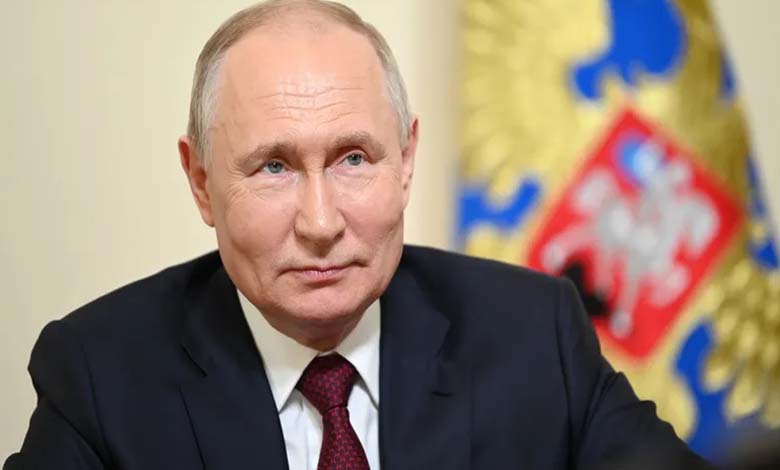The 1000th Day of the Ukrainian War… Putin Opens the Nuclear Door

A significant development occurred in Russia as the war in Ukraine entered its 1000th day.
On Tuesday, Russian President Vladimir Putin approved an update to his country’s nuclear doctrine.
-
Putin and Nuclear Development: Features of an “Ongoing Plan” and “Return of Fear”
-
After Putin’s Statements… What is the Risk of Amending Russia’s Nuclear Doctrine?
A document published on the Russian government’s website showed that President Vladimir Putin approved the update to the nuclear doctrine today.
Only a few weeks ago, just before the U.S. presidential elections held this month, Putin had ordered changes to the nuclear doctrine stating that any conventional attack on Russia, assisted by a country with nuclear capabilities, could be considered a joint attack on Russia.
The update includes provisions allowing the use of nuclear weapons against a country that does not possess such weapons if it is supported by nuclear powers.
-
Putin: Love is the Most Important Thing in Life
-
Putin Ready for Nuclear War: His Stance on US Forces in Ukraine
The presidential decree signed by Putin states that “in order to improve Russia’s state policy on nuclear deterrence, I have decided to adopt (the document) ‘Principles of the State Policy of the Russian Federation on Nuclear Deterrence.'”
The decree takes effect from the date of its signing, November 19.
The updated nuclear doctrine confirms that Russia’s state policy on nuclear deterrence is defensive in nature, with Russia making all necessary efforts to reduce the nuclear threat. Nuclear weapons are viewed as a deterrent, and their use is considered a last resort in case of necessity.
-
A journalist competes with Putin for the presidency under the slogan “Toughness versus Gentleness”
-
Putin thanks Mohamed bin Zayed… and “the man of peace” sends an important message to the world
Here are the key points of the Russian nuclear doctrine:
- Deterring a potential enemy from aggression against Russia and its allies is one of the government’s top priorities.
- Aggression against Russia and its allies by a non-nuclear state supported by a nuclear state will be considered a joint attack.
- Russia’s readiness and determination to use nuclear weapons will ensure nuclear deterrence.
- Russia may use nuclear weapons in case of a serious threat to its sovereignty and territorial integrity, as well as that of Belarus.
- Among the conditions for using nuclear weapons is the launch of ballistic missiles at Russia.
- Providing land and resources for aggression against Russia is a basis for using nuclear deterrence against such a state.
- Aggression by any state of the military alliance against Russia or its allies will be considered aggression by that entire alliance.
-
Washington increases pressure on Russia by calling on European countries to arrest Putin
-
International Criminal Court issues arrest warrant against Putin for committing war crimes, Moscow: ‘We do not recognize it’
- Russia reserves the right to use nuclear weapons in response to the use of weapons of mass destruction against it or its allies.
- Russia practices nuclear deterrence against potential adversaries, a concept that includes countries, blocks, and alliances regarded as Russia’s enemies.
- The state’s policy on nuclear deterrence aims to maintain nuclear forces at a sufficient level for deterrence.
- Maintaining uncertainty for the potential adversary regarding the size and location of nuclear weapon use is one of the principles of nuclear deterrence.
- Nuclear deterrence aims to ensure the potential adversary understands the inevitability of retaliation in the event of aggression against Russia.
- The state’s nuclear deterrence policy in military conflict ensures the cessation of hostilities on terms acceptable to Russia.
-
Putin’s New Year’s speech: Assertions of Russia’s Power and the West’s ‘Lie’
-
Putin calls for Ukraine military to take power into own hands and overthrow Zelensky
- Maintaining the constant readiness of the nuclear deterrent forces designated for use is a principle of Russian nuclear deterrence.
- The deployment of missile defense systems in space by the enemy constitutes a threat to be neutralized by nuclear deterrence.
- Centralized control over nuclear forces, including those located outside Russian territory, is a principle of nuclear deterrence.
- Nuclear deterrence ensures that the Russian armed forces, through forces and means, are capable of inflicting unacceptable damage on the enemy using nuclear weapons.
Putin‘s signing of the decree modifying Russia’s nuclear deterrence policy comes two days after the news that U.S. President Joe Biden allowed Ukrainian forces to carry out strikes using long-range ATACMS missiles deep into Russian territory.
-
Washington threatens to punish Putin if he invades Ukraine
-
Putin is ready for negotiations and NATO will not expand eastward
The Kremlin said on Tuesday that the goal of the updated Russian nuclear doctrine is to “make potential enemies realize that the response to any attack on Russia or its allies is inevitable.”
Kremlin spokesman Dmitry Peskov clarified that “any attack on Russia by a non-nuclear state with the involvement of a nuclear state will be considered a joint attack.”
-
Putin during his meeting with Assad criticizes foreign forces in Syria
-
Putin’s visit to Libya… Missing agenda and a vague date












